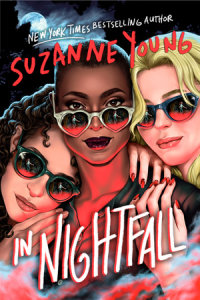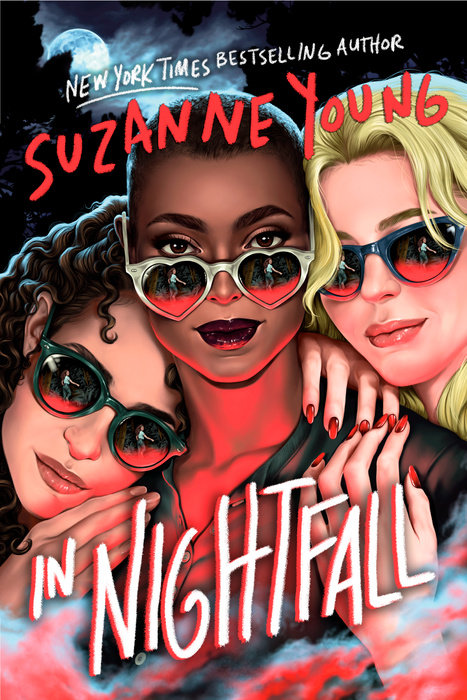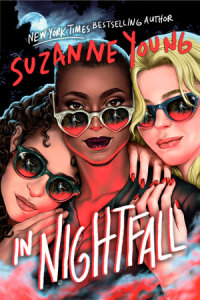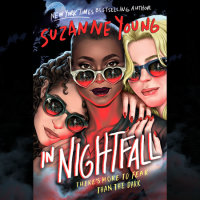In Nightfall
Author Suzanne Young
In the quaint town of Nightfall, Oregon, it isn't the dark you should be afraid of—it's the girls. The Lost Boys meets Buffy the Vampire Slayer in this propulsive novel from the New York Times bestselling author of The Treatment.
Theo and her brother, Marco, threw the biggest party of the year. And got caught. Their punishment? Leave Arizona to spend the summer with their grandmother in the rainy beachside town of Nightfall, Oregon—population 846 souls.
The…
In the quaint town of Nightfall, Oregon, it isn't the dark you should be afraid of—it's the girls. The Lost Boys meets Buffy the Vampire Slayer in this propulsive novel from the New York Times bestselling author of The Treatment.
Theo and her brother, Marco, threw the biggest party of the year. And got caught. Their punishment? Leave Arizona to spend the summer with their grandmother in the rainy beachside town of Nightfall, Oregon—population 846 souls.
The small town is cute, when it’s not raining, but their grandmother is superstitious and strangely antisocial. Upon their arrival she lays out the one house rule: always be home before dark. But Theo and Marco are determined to make the most of their summer, and on their first day they meet the enigmatic Minnow and her friends. Beautiful and charismatic, the girls have a magnetic pull that Theo and her brother can't resist.
But Minnow and her friends are far from what they appear.
And that one rule? Theo quickly realizes she should have listened to her grandmother. Because after dark, something emerges in Nightfall. And it doesn’t plan to let her leave.
An Excerpt fromIn Nightfall
Chapter One
Welcome to Nightfall, Oregon—population 876 souls. I watch through the backseat window as we pass the town line, which is marked with a billboard of a glittering ocean bordered by looming pine trees. An oasis in the middle of nowhere. Which I guess is technically true. I haven’t seen so much as a gas station in over an hour.
Instead, trees with bright green leaves press in around our car, rows of them suffocating us along the road. There is no open space. No daylight. Only endless pines and the gray, gloomy sky. I already miss the clear Arizona horizon.
To Grandmother’s house we go, I sing miserably in my head. Not that me or my brother has ever met our grandmother. She’s more like a rumor from my childhood—an apparition a thousand miles away who sends a birthday card with a crisp hundred-dollar bill inside. She’s an old-fashioned picture in our family photo album, tucked in the back and never really explained. She’s also the woman who will be in charge of…
Chapter One
Welcome to Nightfall, Oregon—population 876 souls. I watch through the backseat window as we pass the town line, which is marked with a billboard of a glittering ocean bordered by looming pine trees. An oasis in the middle of nowhere. Which I guess is technically true. I haven’t seen so much as a gas station in over an hour.
Instead, trees with bright green leaves press in around our car, rows of them suffocating us along the road. There is no open space. No daylight. Only endless pines and the gray, gloomy sky. I already miss the clear Arizona horizon.
To Grandmother’s house we go, I sing miserably in my head. Not that me or my brother has ever met our grandmother. She’s more like a rumor from my childhood—an apparition a thousand miles away who sends a birthday card with a crisp hundred-dollar bill inside. She’s an old-fashioned picture in our family photo album, tucked in the back and never really explained. She’s also the woman who will be in charge of our summer, even if our dad is along for the ride.
I look between the front seats at my father, who’s driving us to our dreaded summer destination in the rainiest part of Oregon. My brother groans and thumps his forehead against the passenger-side window.
“Why are we coming here, again?” Marco asks, taking out one of his earbuds. “She probably doesn’t even have internet.”
“Your grandmother has the internet,” our father says. “And you know why we’re here. You can’t be trusted.”
Here we go.
“Dad—” Marco starts, but our father cuts him off.
“I don’t want to hear it,” he says. “You had your opportunity. And instead, you and your sister”—he hikes his thumb in my direction—“decided to throw a party and destroy my house.”
“It’s technically our house too, Dad,” I say unhelpfully. He ignores me and continues his scolding.
“Forty-six people,” our father says. “The police were set to arrest forty-six people when they called me.” He ticks off the charges like they’re baseball strikes. “Underage drinking, disorderly conduct, public disturbance.”
Marco turns back to covertly hold up five fingers as he makes a zero with his other hand, mouthing, “It was fifty people,” to me. I bite back my laugh.
“While Theodora was doing God-knows-what in her room,” my father adds.
“Ew,” I say, looking around. “I was watching Netflix with my friends. And why are you using my full name when dipshit over here is the one who printed up flyers?”
“Dipshit?” Marco repeats, offended.
“You’re both dipshits,” our father says quickly to get back to his point. “You ruined the carpet, broke the handle off the refrigerator, and completely destroyed the pool pump. I mean, how does that even happen?”
Marco chuckles to himself. “Well, Mira Lopez thought it would be funny to put—”
“That was rhetorical!” our father says, exasperated. “Point is, if it weren’t for your uncle Gabriel and his law office, you all would have spent the night in jail.”
“That’s not entirely true,” Marco says with a shrug. “Mom said we would have gotten a citation, but it’s highly unlikely the Tempe police would have—”
My dad gives him a stern look, and Marco snaps his mouth shut.
Considering our father has been yelling at us for the past two weeks and 936 miles, I can practically recite my brother’s half of this conversation by heart. Not to mention that I’ve already apologized to my father at least ten times. If I had a time machine, I would go back and talk my brother out of throwing an absolute rager of an end-of-the-year party. But it’s a little too late now.
“We get it, Dad,” Marco says, sounding resigned. “And we get that we had nowhere else to go this summer. Sorry I brought it up.” He slips his earbud back in and turns to look out the passenger window again.
His words sting, and I glance in the rearview mirror and see a flash of guilt cross my father’s face. It wasn’t Marco’s intention to hurt his feelings, but . . . well, we’re all hurting. Divorce is like that, I guess.
Although my parents have only been officially divorced for a month, they separated two years ago. In an attempt to normalize the dissolution of our family, my parents conducted the entire process as if it were a corporate takeover, devoid of tears or blame. They spoke in legal terms: timetables, asset division, custody.
But in reality, it was more emotional than they admitted. My mother fell out of love, and no amount of marriage counseling would change that fact. Ultimately, she found some renewed passion with a guy named Dale who sells car insurance and owns polo shirts in about fifteen different shades of blue.
Since the divorce was finalized, my dad has been deeply sad. Honestly . . . I think he always expected my mother would eventually come home. Now that the possibility is gone, my father has been trying to get his life together. He even joined a cycling team and started therapy. It’s also why he wanted to spend time in his hometown. Find myself again, he told us in a moment of oversharing. Although how he plans to do that with his seventy-year-old mother and two teenage offspring hanging around is beyond me. We shouldn’t even be here.
Marco and I live with our father during the school year— a choice we made because his house is within walking distance of Tempe High. Our summers and holidays are usually spent with our mother at her condo in downtown Phoenix. But due to an unforeseen complication, this year’s plans changed.
Mom moved in with Dale and his kids. There’s nowhere for Marco and me to sleep at his house until they buy a bigger place—together. To say my brother and I are furious about this is a bit of an understatement. I haven’t spoken to my mom in over two weeks. Since our father had already requested time off from his marketing job to visit our grandmother in Oregon, he decided to let us stay at our house unsupervised. Marco’s going to be a senior and already eighteen and I’ll be a junior. It was all set.
And then Marco fucked up. Although in all honesty, I wasn’t just watching Netflix either. I was in my room doing shots with the rest of the volleyball team and playing Cards Against Humanity. Which of course I regret.
But it was easily the best party of the year.
Already homesick, I look out the window and twist to stare up at the sky. I assume there’s a sky somewhere beyond the trees and thick clouds. I can’t stand the dreariness of it all.
“Listen,” my father says, drawing my attention again. He glances at me in the mirror, his expression softer, before turning to Marco. “I know things have been difficult. I do. Let’s just . . . let’s put it behind us and have a good time. You’ll like it here.”
“I’m sure,” Marco says half-heartedly.
Dad looks in the rearview mirror at me and smiles. “Theo?” he asks hopefully.
“I don’t know what you mean,” I say, deadpan. “I’m already having a great time.”
Marco snorts a laugh from the front seat, and the tension in the car dissipates.
Our father nods, a slight smile on his lips. “Excellent,” he says. “Because we . . .”
His voice trails off when we notice two people up ahead walking along the side of the road. They’re young—our age, I think. A guy and a girl wearing large backpacks, the kind you hike Europe with. I can’t see the guy’s face, but the girl turns in our direction. She’s incredibly pretty, with curly black hair that hangs in tangled waves just past her shoulders and a wide smile. She sticks up her thumb, her expression hopeful.
“Are they hitchhiking?” Marco asks, surprised.
“No,” I tell him. “She just thinks you’re doing a really great job.”
He shakes his head. “You suck, Theo.”
Our car slows a bit and my heart skips at the thought of my father picking up two strangers in the woods. Isn’t that dangerous? My dad watches the couple as we approach, squinting as if to get a better look.
“Dad, are you sure . . . ?” I start to ask if this is safe, when suddenly my father steps on the gas and speeds past them.
My back hits the seat and I turn to see the girl lower her arm, laughing to herself. The guy, however, holds up his middle finger to us in salute.
“Damn,” Marco announces, sounding surprised. “That was coldhearted, Dad.”
I’m with Marco. It was cold, and completely unlike my father. He doesn’t meet my eyes in the mirror, staring out the windshield instead.
“Why didn’t you pick them up?” I ask. “You slowed down.”
“Theo,” he replies, “I slowed down to make sure they were okay. They looked fine. Besides, where would we have put them? Those bags were easily the size of you.”
I look around our overstuffed car. He has a point there, but still . . . it was pretty rude. Even if they were two possibly homicidal strangers.
“I didn’t even know people still hitchhiked,” Marco adds. “And I mean . . . where are they going? There’s nothing out here.”
“They’re headed to Nightfall,” our father says. “We get a lot of tourists this time of year.”
“Tourists?” I repeat. “How do they even know about this place? I’d never heard of it; neither had my friends. Like literally, never heard of it.”
“Nightfall is one of those hidden gems,” my father says. “A word-of-mouth destination. But that’s part of the charm—it’s like a secret you’ve been let in on. Once they’re here, some people just . . . stay. They never want to leave.”
“Yeah, well,” Marco replies, “once our month here is up, I’ll be sprinting over the town line to get back home.” He looks at our dad. “No offense.”
“None taken,” he replies flatly.
“How come Grandma has never visited us in Arizona?” I ask my father. “And why have we never been to Nightfall?” It feels weird calling a stranger “Grandma.” The word sticks awkwardly in my mouth.
“Yeah, why haven’t we been to this secret tourist destination before?” Marco adds with a grin. “And what about Mom? Has she ever been to Nightfall?”
“Your grandmother is a very private person,” our father says. “She doesn’t like traveling, especially long distances. She’s never been on a plane and isn’t going to start anytime soon. So, unfortunately, she’ll probably never enjoy the Valley of the Sun with us. As for your mother, yes, Rosie did come to Nightfall with me once when we first started dating. But she said it gave her the creeps—small towns can feel that way to some people. Plus, she hated the food,” he adds.
Our mother hates the food everywhere, so this isn’t a surprise. She owns Rosalinda’s, a Mexican restaurant in downtown Phoenix. And truly, no food is as good as hers.
“Wow,” I say with smile. “Bad food and a creepy small town. Perfect.”
“It’s not creepy,” my dad replies. “It’s beautiful. You’ll see.”
Marco turns to him. “It sounds perfect,” he says. “Now please tell us more about our antisocial grandmother. What’s she like?”
“She’s not antisocial,” our father says. “Look, in all honesty, she is a bit . . . unusual. Your grandmother has an old-world way of thinking, but it’s harmless. Her superstitions make her feel better. When you meet her, just indulge her a little,” he adds. “For me.”



